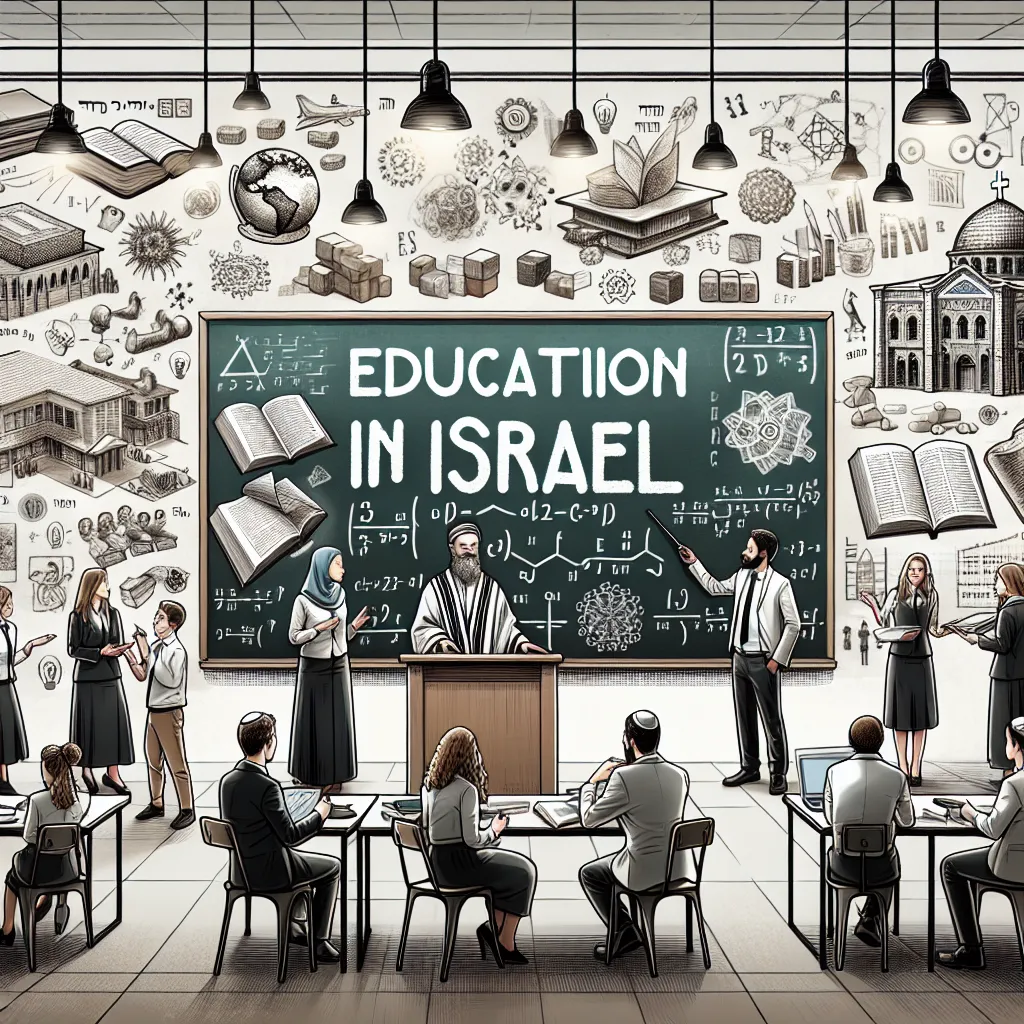How is the education system structured in Israel?

- How is the education system structured in Israel?
- How is the education system in Israel structured?
The education system in Israel
The education system in Israel is largely similar to European models, including the stages of preschool, secondary, and higher education. However, it also stands out with a number of unique national characteristics that deserve more detailed analysis.
Preschool education
Preschool education in Israel typically starts at an early age. Women can expect three months of paid maternity leave, with an additional six months of unpaid time available. After this period, young mothers are required to return to work, which creates a need for suitable childcare. While some families may rely on grandparents, others opt for professional nanny services or send their children to daycare and kindergartens.
Stages of preschool education
- mishpahtonNursery - for children from 3 months to 3 years old;
- trom trom-khovu (junior group of the kindergarten) — for children aged 3 to 4 years;
- trom-khovu (middle group of the kindergarten) — for children aged 4 to 5 years;
- gan-khovu (senior group of kindergarten) — for children aged 5 to 6 years.
Most preschool institutions operate until noon, but many of them offer extended day programs, which is convenient for parents who work full-time.
The cost of preschool education
The prices for preschool education vary depending on the type of kindergarten—public or private institutions. Although preschool education is not mandatory, parents will have to incur some expenses. A private kindergarten typically costs between 2,000 to 3,000 shekels (approximately $570–$860), while a public kindergarten with extended hours will cost about 1,000 to 2,000 shekels (around $280–$570) per month. An important moment comes when the child turns six and is preparing to go to school.
Secondary education
Secondary education in Israel consists of three main levels:
- elementary school (grades 1-6, ages 6-12);
- middle school (grades 7-9, ages 12-15);
- high school (10th—12th grades, ages 15-18).
The school year starts on September 1, similar to Russia, and ends on June 30 for younger grades and June 20 for older grades. Although the summer vacation is relatively short, Israeli students can take breaks during the school year thanks to periodic holidays that coincide with religious celebrations, such as Sukkot — a week-long break, Hanukkah, and Passover, during which weekends are also included.
Types of educational institutions
Several types of educational institutions are represented in the country:
- public schools, which follow the programs of the Ministry of Education. They provide free education for more than 70% of children. Parents only need to pay for educational materials, such as books, notebooks, and sports uniforms;
- state religious schoolsalso working under the government program, but with a focus on the study of religion and traditions.
Thus, the educational system in Israel is characterized by great diversity and includes both secular and religious elements, which allows it to meet the needs of various population groups.
The educational system of Israel
In Israel, the education system is based on national standards and programs created by the Ministry of Education. However, significant attention is given to the study of religious subjects. Education in religious institutions is provided free of charge and is focused on adhering to Orthodox norms.
The curricula in religious schools differ significantly from the official standards set by the ministry, as the focus is primarily on religious subjects. At the same time, these institutions do not neglect the fundamentals of general education, such as mathematics, English, and other sciences.
Specialized educational institutions
There are many specialized schools that focus on the arts, sciences, and technical disciplines. These institutions aim to develop students' creative and research skills.
9 October 2024
9 October 2024
9 October 2024
29 January 2025
29 September 2025
Private educational institutions follow the recommendations of the ministry, but at the same time, they implement new methods that meet modern requirements. The tuition fees vary and depend on the quality and resources of the specific school.
The process of enrolling in schools
Automatic enrollment of children in primary classes is based on their place of residence. Changing schools can be difficult and sometimes even impossible for parents.
- Transferring children to another school is only allowed after the sixth grade.
- Many parents are eager to take advantage of this opportunity to transfer their children to more prestigious or stronger educational institutions.
Approach to learning
Teaching in Israeli schools is characterized by a gentle and tolerant approach. In elementary grades, students are not required to have special knowledge or skills, which makes the learning process less stressful.
Teachers interact with students as equals, thereby creating a comfortable learning environment. The communication between teachers and children is informal, using "you," and strict discipline is almost nonexistent. Children are free to communicate, move around the classroom, and engage in conversations as part of the learning process.
Transition to high school
Nevertheless, such freedom during learning can lead to difficulties during the transition to high school. At this time, intensive exam preparation begins. Teenagers actively prepare for testing, making plans for successful military service, while thoughts about higher education only start to emerge after completing their military careers.
Higher education in Israel
The state of higher education in Israel is one of the strongest in a global context. It boasts high-quality teaching, which is clearly demonstrated by the achievements of Israeli scholars and professionals in fields such as economics, politics, medicine, and science.
Development of science, medicine, and technologyIsrael holds leading positions on a global scale.
Admission to universities
To be admitted to university, it is necessary not only to demonstrate excellent results in the high school diploma but also to achieve high scores on the psychometric test.
- This exam assesses a student's readiness for study by selecting the appropriate level of preparation.
- The test can be taken in one of five languages, including Russian.
Israeli universities are trying to attract students with high scores, and those with scores ranging from 750 to 800 are of particular interest. The leading universities in the country are literallyfightingfor such highly qualified applicants, emphasizing their commitment to the quality of education and personnel.

Conclusion
In conclusion, the education system in Israel represents a unique blend of traditional approaches and modern requirements. As I mentioned in the article, each level of education—from preschool to higher education—has its own characteristics and nuances that directly impact children's development and their future professional realization. Education in Israel opens up a wide range of opportunities for students, starting from kindergartens, where the foundations of upbringing are laid, to universities that prepare world-class specialists.
One of the key points is that each stage of education requires financial contributions from parents, which can become a serious burden for many families. It is especially worth noting that, despite the availability of free education in public schools, additional expenses for studying, tutoring services, and various extracurricular activities can significantly increase the overall education budget.
The variety of schools and approaches to education allows parents to choose the most suitable path for their children, which is undoubtedly a plus. However, this flexibility also imposes a certain responsibility, as the way a child's educational trajectory is realized depends on the parents' choice.
And finally, I want to note that the high level of higher education in Israel serves as an example for many countries, confirming that investments in education are investments in the future of the nation. The training system in Israel has its own distinctions, and this diversity provides the country with a growing influx of talented specialists capable of making a significant contribution toglobal science and technology.
Thus, it can be asserted that the Israeli education system, despite its shortcomings and challenges, remains one of the most effective in the world. My belief is that understanding these nuances will help parents and the education system itself strive for even greater achievements and provide better preparation for future generations.
Comment
Popular Posts
9 October 2024
9977
9 October 2024
9149
9 October 2024
1505
29 January 2025
1582
29 September 2025
458
Popular Offers

Subscribe to the newsletter from Hatamatata.com!
Subscribe to the newsletter from Hatamatata.com!
I agree to the processing of personal data and confidentiality rules of Hatamatata





